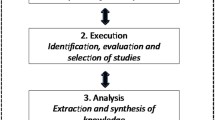Abstract
Sustainably produced products have moved from the niche to the mainstream with higher rates of growth than of conventional product markets. This chapter examines global trends in sustainability product markets and their implications for the development of the sector in India. It shows how the number and uptake of voluntary sustainability standards (VSS) have been increasing and what factors are affecting this positive dynamic and also sheds light on the origins of VSS. The chapter also provides a brief analysis of sustainability trends in India, lists concerns around VSS, which hinder larger and more efficient uptake of such standards by producers including Indian producers, and concludes with recommendations for making sustainable production practices a norm.
Access this chapter
Tax calculation will be finalised at checkout
Purchases are for personal use only
Similar content being viewed by others
Notes
- 1.
Sustainably produced products are the ones that were produced with respect to environment, human rights and with economic benefits for local communities and workers.
- 2.
UTZ is a label and programme for sustainable farming of coffee, cocoa, tea and hazelnuts. Its mission is to create a world where sustainable farming is the norm. Source: https://utz.org/
- 3.
Standards Map is one of ITC’s market analysis tools, for the latest information refer to www.sustainabilitymap.org.
References
AIM-Progress. 2018. Mutual Recognition. Accessed April 21, 2018. http://www.aim-progress.com/page.php?pmenu=2&id=22.
Euromonitor International. 2017a. Organic Packaged Food in India. Euromonitor.
———. 2017b. Organic Beverages in India. Euromonitor.
Fiorini, Matteo, Schleifer Philip, Solleder Olga, Taimasova Regina, Jansen Marion, Wozniak Joseph, and Hoekman Bernard. 2016. Social and Environmental Standards: Contributing to More Sustainable Value Chains. Geneva: International Trade Centre.
Fiorini, Matteo, Schleifer Philip, and Taimasova Regina. 2017. Social and Environmental Standards: From Fragmentation to Coordination. Geneva: International Trade Centre.
GFSI. 2018. Recognized Certification Programmes. Accessed April 21, 2018. https://www.mygfsi.com/certification/recognised-certification-programmes.html.
Jain, Shikhar, and Archith Ashok. 2017. Drivers and Constraints for Adopting Sustainability Standards in Small and Medium-Sized Enterprises (SMEs) and the Demand for Finance: An Indian Case Study (Part II: Micro perspective). In Drivers and Constraints for Adopting Sustainability Standards in Small and Medium-Sized Enterprises (SMEs) and the Demand for Finance Case Studies from Brazil, China, India, Indonesia and South Africa, ed. C. Sommer, 65–92. Bonn: German Development Institute/Deutsches Institut für Entwicklungspolitik (DIE).
Kathuria, Rajat, Goldar Amrita, and Jain Sajal. 2017. Drivers and Constraints for Adopting Sustainability Standards in Small and Medium-Sized Enterprises (SMEs) and the Demand for Finance: An Indian Case Study (Part I: Macro Perspective). In Drivers and Constraints for Adopting Sustainability Standards in Small and Medium-sized Enterprises (SMEs) and the Demand for Finance: Case Studies from Brazil, China, India, Indonesia and South Africa, ed. C. Sommer, 45–64. Bonn: German Development Institute/Deutsches Institut für Entwicklungspolitik (DIE).
Lernoud, Julia, Jason Potts, Gregory Sampson, Salvador Garibay, Matthew Lynch, Vivek Voora, Helga Willer, and Joseph Wozniak. 2017. The State of Sustainable Markets—Statistics and Emerging Trends. Geneva: International Trade Centre.
Mende, Rayk. 2017. Aldi North Group Interim Report 2016. Essen: ALDI Einkauf GmbH & Co. oHG. Accessed April 20, 2018. https://www.cr-aldinord.com/2015/wp-content/uploads/sites/2/2017/07/ALDI_North_Group_Interim_Report_2016.pdf.
Pande, Manish. 2017. The India Story: Impact of Private Sustainability Standards on Market Access and Sustainable Development. New Delhi: United Nations Conference on Trade and Development.
Potts, Jason, Vivek Voora, Matthew Lynch, and Aynur Mammadova. 2017. Standards and Biodiversity. Winnipeg, MB, Canada: International Institute for Sustainable Development.
Textile Exchange. 2018. Production 2016. Accessed April 24, 2018. http://aboutorganiccotton.org/stats/.
World Wildlife Fund. 2017. Palm Lines—Envisioning a Sustainable Future for the Indian Palm Oil Industry. New Delhi: WWF. Accessed April 23, 2018. http://awsassets.wwfindia.org/downloads/Palm_Oil_Report_2017.pdf.
Author information
Authors and Affiliations
Corresponding author
Editor information
Editors and Affiliations
Rights and permissions
Copyright information
© 2019 The Author(s)
About this chapter
Cite this chapter
Taimasova, R., Kasterine, A., Lamolle, M. (2019). Global Trends in Sustainable Markets and Implications for India. In: Arora, B., Budhwar, P., Jyoti, D. (eds) Business Responsibility and Sustainability in India. Palgrave Studies in Indian Management. Palgrave Macmillan, Cham. https://doi.org/10.1007/978-3-030-13716-8_3
Download citation
DOI: https://doi.org/10.1007/978-3-030-13716-8_3
Published:
Publisher Name: Palgrave Macmillan, Cham
Print ISBN: 978-3-030-13715-1
Online ISBN: 978-3-030-13716-8
eBook Packages: Business and ManagementBusiness and Management (R0)




